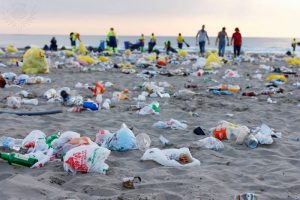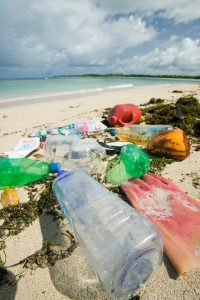Did you know that roughly 8 million tons of plastic are thrown into the ocean every year? It’s true! Every minute, a garbage truck of plastic is dumped into our oceans. If this continues, in about 30 years there will be more plastic than fish in the ocean. Many marine creatures eat the plastic because they can’t tell the difference between the plastic and food. And, of course, if fish eat plastic and we eat them, then we are eating plastic, too. We need to prevent the plastic pollution in our oceans!
National Geographic Kids has ten easy steps that you can take to help reduce the amount of plastics in our oceans. Here are their tips:
- Say no to straws. Animals can get sick after mistaking them for food. Instead, carry your own paper straw or reusable version.
- Fill up at a fountain. Drink out of a reusable water bottle instead of a single-use bottle. That way you won’t be buying one of the nearly one million plastic drink bottles sold every minute around the world.
- Make a better bag. Pack sandwiches and snacks in reusable containers or cloth sacks instead of plastic bags.
- Snack on fruit. Pack an apple, banana, or orange instead of snack packs. Fruit fills you up in a healthy way, plus there’s no extra packaging. (Save the core, peels, and rinds for your compost bin.)
- Build a good goodie bag. Don’t fill your birthday goodie bags with plastic yo-yos and other trinkets for your friends. Instead, give them homemade treats or coupons to a local bakery.
- Go for the cone. No matter your favorite ice cream flavor, always choose to have it in a cone. Who needs plastic spoons and cups when you can eat the bowl?
- Buy in bulk. Encourage your family to shop for snacks, cereal, and pasta in the bulk section of the grocery store to avoid waste from plastic packaging. Then store it all in reusable containers.
- Ditch microbeads. Don’t use face wash or toothpaste with microbeads. (If the ingredients label lists polyethylene or polypropylene, the item likely contains microbeads.) These tiny plastic beads go down the drain, eventually going to rivers, lakes, and the ocean. There they can be mistaken for food by fish and sea turtles – a dish that could be deadly.
- Never litter. Hey, sometimes you have to use plastic, and that’s OK! But always recycle the plastic that you can, and never leave it in the environment. Trash left on the ground often blows into creeks and rivers, eventually making its way to the ocean.
- Pick up what you can. Grab a parent and pick up the trash that you can find in your local creek or river. But be careful: wear gloves and never grab anything that looks sharp or dangerous.
And here are some books about ocean pollution so you can learn more:
The Great Pacific Garbage Patch




